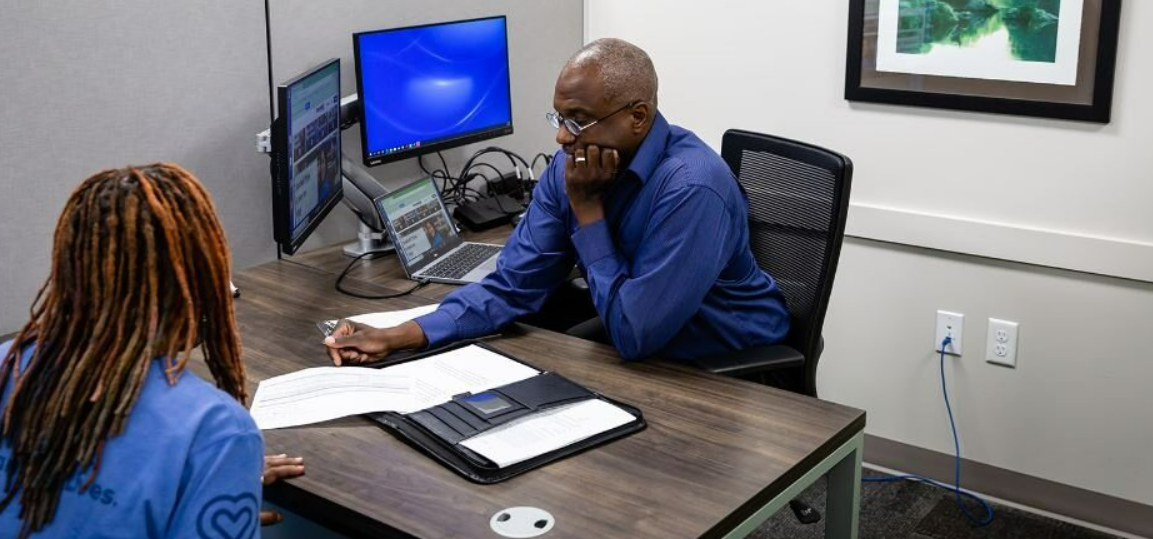Tulsa’s free financial counseling helps cut debt, boost savings
- Tulsa partnered with Goodwill to offer free financial counseling
- The counseling helps residents reduce debt and increase savings
- But financial literacy isn't a cure-all for those who lack resources

The Tulsa Financial Empowerment Center. Photo courtesy of the Tulsa Financial Empowerment Center.
(NewsNation) — A partnership between Goodwill and the city of Tulsa is providing free financial counseling to area residents, helping them improve their credit scores and reduce their debt.
Financial literacy is a challenge for many Americans. By one estimate, less than one-fifth of Americans took a financial literacy class in high school. Literacy gaps among young people, Black and Hispanic communities and low-income households make them more vulnerable to financial hardships, according to the FINRA Foundation.
Tulsa’s Financial Empowerment Center (FEC) opened in December 2020 thanks to a grant from the Cities for Financial Empowerment Fund.
The service is offered by the city free of charge for all residents, but Goodwill provides the counselors and staff. For comparison, nonprofit credit counseling services can charge fees up to $79 a month.
“These are one-on-one sessions,” said Modi Kwanza, who serves as Goodwill’s coordinator for the program. “So we don’t have group classes or anything, it’s private, you’re talking with that counselor, with that client.” (They also accommodate couples.)

The consultations focus on a few general areas.
“We’re talking banking, we’re talking credit, debt and savings,” Kwanza said.
But there’s no one curriculum that the center has each client follow; the counselors help clients identify their areas of need, and they then work together with them to create a plan that will help them improve their financial situation.
The FEC also coordinates with other parts of the city government. For instance, a city agency that helps Tulsans with home ownership may send their clients to the center to prepare themselves for what comes next.
“After you’ve bought the home, what’s going to happen? We start looking for budgets for that,” Kwanza said.
Data is important for this process. The center tracks a client’s progress towards their goal, whether it’s improving their savings or reducing their debt.
“So every piece of homework, every goal that they set, we have a place where we can store that so that when they achieve it we can mark it, show it,” Kwanza said.
Some possible goals clients can achieve could be improving their credit score by 35% or reducing non-mortgage debt by 10%.
Since the center has been in operation, it has helped clients reduce their non-mortgage debts by $770,000 and increase their savings by around $243,000. The average client’s savings increased by about $3,000, while their average debt reduction was about $2,400. In all, they’ve served around 1,300 clients.
But Kwanza emphasized that the center’s goal is financial counseling, not financial advising.
“So we can’t say, here’s a great stock that you can invest in. That’s not our training, that’s not our area,” he said.
Janae Bradford, director of the city’s Office for Financial Empowerment and Community Wealth, said that one of the biggest challenges it faces is overcoming stigma.
“Trying to convince folks that it’s safe and non-judgmental and you can come to the FEC if you’re in crisis mode or if you’re not,” she said.
Kwanza emphasized that better budgeting can’t solve all of a client’s financial problems if they simply don’t have enough income.
“I personally don’t subscribe to the idea that we can budget somebody out of poverty. So if the struggle just is there’s not enough there, it can be frustrating on the counselor’s side, it can be frustrating on their side,” Kwanza said.
But he also pointed to what financial literacy can achieve.
“Not a lot of folks have that $400-$500 buffer for the emergency. And so if we’re helping folks get to that area, that’s another sign of financial well-being,” he said.










